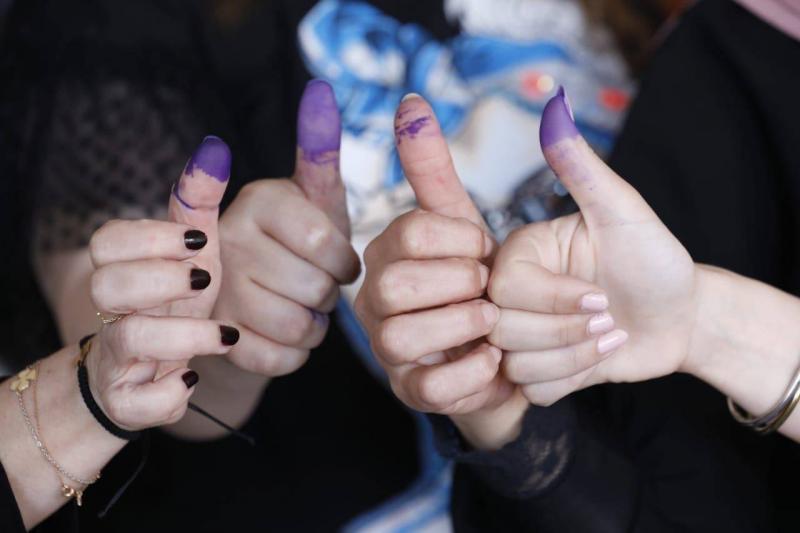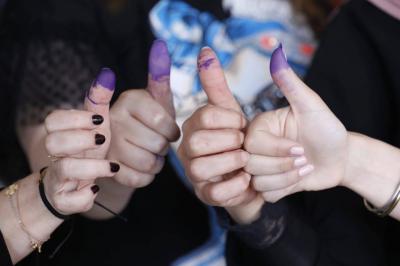This is the second cycle of parliamentary elections under a law enacted in 2017, which governed the elections of 2018 and will oversee the elections of 2022 tomorrow. The law is characterized by significant ambiguity; although it introduced proportionality for the first time into the voting system in Lebanon, it relies on a hybrid mix of proportional, majority, and individual voting through the use of preferential votes, closely resembling the sectarian "Orthodox law" proposal.
Most importantly, this election has attracted a substantial number of reporters from Arab and foreign media to Lebanon, a presence not seen since the Beirut Port explosion on August 4, 2020. This will be the first parliamentary election that will yield a new parliament following a series of “historical” events that have plunged Lebanon into an unprecedented catastrophic reality, both in its ancient and modern history. It will be held under the weight of the last three years, which have experienced the most dangerous, severe, and largest financial, banking, economic, and social collapse that Lebanon has ever known, reducing its people to one of the poorest, most bankrupt, indebted, and politically and administratively corrupt nations.
These are the first elections held after a massive popular revolution or uprising of a magnitude never known before in Lebanon, crossing sectarian and regional lines, driven primarily by the opposition to political corruption. Although this uprising has receded and diminished, it tomorrow presents dozens, if not hundreds, of candidates in a precise test to gauge how much the "change bearers" can bring to the new elected parliament through the ballot boxes.
These elections will also occur following the devastating disaster that struck the heart of Beirut, which perforated it in a manner worse than wars, invasions, air raids, and missile shelling—referring to one of the largest conventional explosions of the era in the Beirut Port, which resulted in over 210 martyrs, injured about six thousand, and displaced hundreds of thousands from tens of thousands of buildings and homes.
The most alarming aspect of this catastrophic event is that the open judicial investigation into it has been shrouded in a suspicious and conspiratorial blockade, with those conspiring against the truth succeeding in colluding with the submissive in failing to protect the rights of the victims and affected in achieving justice, thereby paralyzing and freezing this investigation to date—a first of its kind and the gravest in the history of similar cases, reminiscent of the disappearing truths in the assassination cases of martyrs of freedom, sovereignty, and independence.
If presenting the grand facts and major realities during previous catastrophic years between elections aims to dust off the heavy memories of misery surrounding the Lebanese, then it seems natural and obvious that the culmination of hopes, both internal and external, rests on whether Sunday, May 15, 2022, will be a date like no other and a momentous occasion unlike any before it.
With all the excitement surrounding tomorrow, the crucial existential question arises, laden with implications and consequences for Lebanon as it has been through its history, not as it has been "turned into" a country of deadly dependency on external axes and destructive conflicts, in addition to impoverishing and starving most of its population. The question is as existential as the tragic reality for the Lebanese: will Lebanese voters on May 15, 2022, transform the date into the birth of a liberated ballot revolution that opens the way, on the night of Sunday, for a true revolution through pure democracy, paving the road for the rescue of Lebanon and its deliverance from the system of catastrophes, tragedies, and the fatal depletion of the nation and its people?
### Security Readiness
In anticipation of the decisive election day, concerned officials have competed to confirm the completion of logistical preparations and security readiness to ensure the safety of the electoral process amidst escalating rhetorical and media spats that have extended beyond politics to some religious sites, as demonstrated by the provocative statements recently issued by the Jaafari Mufti Sheikh Ahmad Qabalan.
As for official political positions, it was striking once again that President Michel Aoun preemptively cast doubt on some aspects of the electoral process, stating yesterday that "some money used in the electoral entitlement comes from outside Lebanon, and we rely on the awareness of voters and their rejection of being goods bought and sold." He informed the European Union delegation monitoring the parliamentary elections that “there are candidates exploiting the difficult economic and social conditions and paying money to hijack voters' choices, which should be free of any constraint.” It is noteworthy that the head of the European delegation announced that "monitors will be distributed across all Lebanese regions to ensure comprehensive monitoring of the elections in support of the democracy that Lebanon enjoys."
Interior and Municipalities Minister Bassam Mawlawi chaired a security meeting attended by officers from security and military agencies to coordinate practical steps on the ground during the elections. Mawlawi explained that electricity issues had been entrusted to the State Security agency, which prepared a complete plan to coordinate with the owners of generators and places that have generators, such as municipalities and religious centers. “We have equipped all polling stations and ballot boxes with the necessary bulbs and managed to connect with a technical team that is always present. We also prepared the necessary arrangements with the registration centers to ensure electricity at all times,” he noted.
Additionally, National Defense Minister Maurice Slim confirmed that the army would be deployed throughout all Lebanese territories outside polling stations starting today to assist internal security forces in ensuring the smooth conduct of the parliamentary elections on Sunday in terms of maintaining security and intervening in any incident that could affect the integrity of the voting process, as coordinated with other agencies, where the army oversees the work of its units through a central operations room at army headquarters and sub-operations rooms in each of the five military region commands.
### Nasrallah and Qabalan
In the electoral scene, ahead of the onset of the electoral silence just past midnight, the muftis of the regions responded to the call from Grand Mufti Sheikh Abdul Latif Derian urging citizens "to vote with high turnout and not to abstain from their constitutional rights and duties." In contrast, the Secretary-General of Hezbollah, Sayyed Hassan Nasrallah, renewed his accusations against the party's adversaries of “conspiring.” He asserted, in his third address this week at a Hezbollah festival in northern Bekaa, that "the conspirators aimed for the resistance environment to turn against the resistance, with the most targeted area being Bekaa, especially Baalbek-Hermel."
His large presence is a testament to their commitment to and loyalty to the resistance, which they embody. He emphasized, “We thank your attendance, which is anticipated and not surprising—it could surprise the conspirators who have wagered over the past years that the environment of resistance would turn against it.” He specifically targeted candidates from the Lebanese Forces in northern Bekaa, asking, “Have the leaders of some Christian parties who bet on armed groups and prevented the army from fighting considered you? Your blood? Your homes? Your money? Your security? Your dignity? I say to you, they have not thought of you. You must decide; will you be with those who defend you or those who conspire against you? Will you be with the hand that carried the rifle to defend you or with those who handed it over to armed groups to attack you? They appear on the other list.”
A notable statement also came from the Jaafari Mufti Sheikh Ahmad Qabalan, expressing his astonishment at what Maronite Patriarch Cardinal Mar Bechara Boutros al-Rahi said regarding the issue of the country being about the weapons of the resistance, questioning, “Where is the resistance when it fights in Syria, Iraq, Yemen, and elsewhere? Iran violates Lebanon’s sovereignty!” Qabalan expressed regret that the Patriarch does not see with the perspective of Lebanon, stating, “This is closer to a mentality of governance than that of a nation of shared living.” He concluded, “Our decisive electoral choice is the national resistance duo with all its allies, and voting for this alliance is a national, moral, and religious duty.”
### Hostilities
In terms of media confrontations, intense and fierce disputes have flared up between the Free Patriotic Movement and the Lebanese Forces. The head of the movement, MP Gibran Bassil, renewed his attack on the “forces,” claiming that “anyone who votes for their candidates votes for ISIS and Israel.” President Nabih Berri was not spared, as he accused him of “bearing significant responsibility for everything that has happened to the tenure.” The head of the Lebanese Forces party responded strongly in a televised interview in the evening, accusing Bassil and the Free Patriotic Movement of lying, corruption, and theft, stating that Bassil's assertions rely only on a sick mentality, emphasizing that the movement has never had a project to build the state, stressing the priority of confronting Hezbollah's project for the situation to normalize and for the state to be built.




